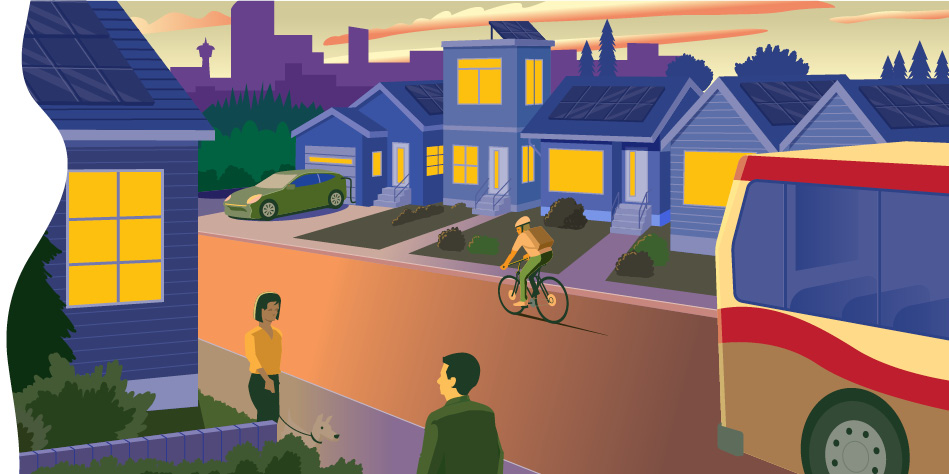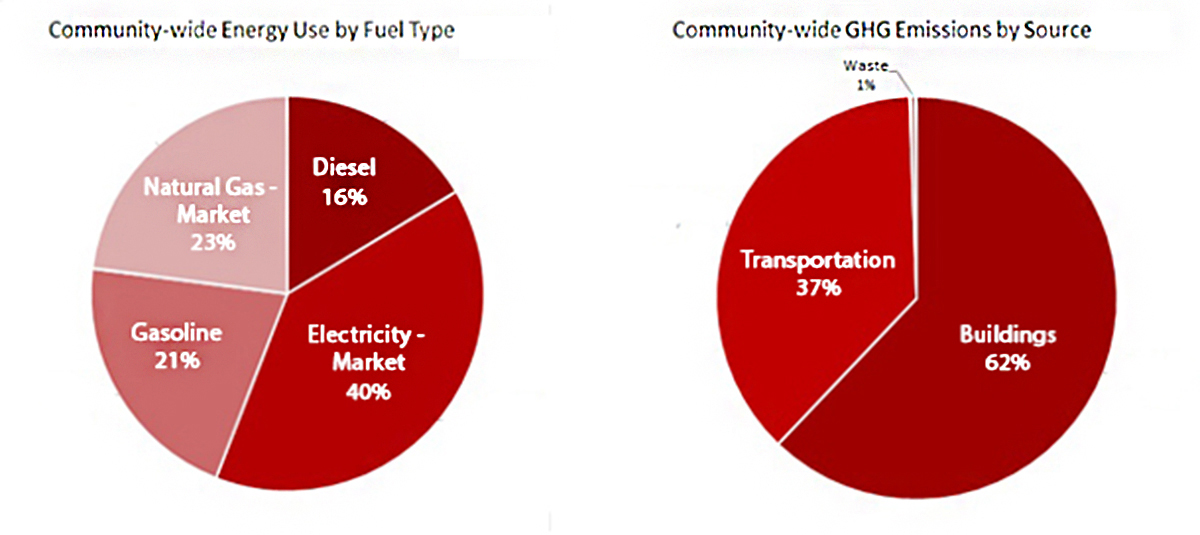Calgary's Climate Program
Climate Emergency Declaration
On November 15, 2021 Calgary City Council voted to declare a Climate Emergency. A declaration of Climate Emergency is a resolution passed by a governing body such as a city council. It puts the local government on record in support of emergency action to respond to climate change, and recognizes the pace and scale of action needed.
More than 2,000 jurisdictions and local governments around the world representing more than one billion citizens have made Climate Emergency Declarations, including most major cities in Canada and the Government of Canada.
Calgarians were invited to provide their perspectives on climate change impacts and actions. Learn more and access background information and reports at Calgary.ca/ClimateUpdate.
In Calgary, declaring a Climate Emergency means:
- That The City of Calgary will become part of the global community (not-for-profit, public and private sectors) taking action on climate change through international initiatives such as the Global Covenant of Mayors, Resilient Cities Network, and Race to Zero, by adopting best practice and leveraging capital investment with the goal of becoming a global center of excellence in climate adaptation and mitigation, and energy transformation;
- That The City of Calgary makes climate change a strategic priority by accelerating the timelines for climate action to reduce greenhouse gas emissions, updating the city-wide and corporate greenhouse gas reduction target to be net zero emissions by 2050 to help limit global warming to 1.5 degrees Celsius;
- That The City of Calgary engage with First Nations, through the Indigenous Relations Office, to foster relations, ensure collaboration, incorporation of traditional knowledge and ensure intersectional Climate Change strategies;
- That The City of Calgary makes climate change a strategic priority by accelerating the timelines to reduce greenhouse gas emissions, updating the city-wide and corporate greenhouse gas reduction target to be net zero emissions by 2050;
- That The City of Calgary develop strategic business plans and budgets across all departments that identify, invest in and accelerate ideas such as high priority emissions reduction, climate risk reduction opportunities, and implementation of a carbon budget;
- That Council direct that The City of Calgary to update agreements with civic partners and subsidiaries to support and ensure alignment with Calgary’s emissions reductions targets; and
- That The City of Calgary will advocate for funding from all orders of government for the purposes of accelerating immediate and near-term actions to rapidly reduce greenhouse gas emissions, reduce climate risk to public built and natural infrastructure, deliver upstream flood and drought mitigation on the Bow River, build community resilience, seek disaster risk reduction from climate change and support strategic opportunities for Calgary’s economy.
View the Notice of Motion for the Climate Emergency Declaration and Call to Action (EC2021-1525)
A Notice of Motion to build accountability into the Climate Emergency Declaration means:
- That Council direct Administration to develop a framework to measure and report on the Climate Strategy actions, budget and annual spend.
- That Council direct Administration to provide ongoing expenditure reports to be submitted to Audit Committee;
- Future reports will explore financials including cost of action/inaction, avoided costs and cost savings as it relates to climate mitigation and adaptation.
- Qualitative reporting to include indigenous world view, equity, and environment
- That Council direct Administration to update the city-wide and corporate greenhouse gas reduction target to be net-zero emissions by 2050 and set sector specific interim targets to ensure accountability and benchmarking;
- That Council direct Administration to present a plan to retrofit and update all City owned assets with clean energy infrastructure and improvements that exceeds current energy standards;
- The Plan should include anticipated timelines, a costs/savings analysis, and an action prioritization of City-owned facilities and operations
- Each Business Unit to build carbon targets and actions into their 2023 – 2026 business plans and budgets
- That Council direct Administration to work with civic partners and subsidiaries to ensure alignment with Calgary’s climate risk reduction goals and emissions reductions target, including the interim targets;
- That Council direct Administration to connect with community partners in an outreach and educational campaign that will empower all Calgarians to play their part in meeting the City’s net-zero target and reduce climate risk in our communities;
How are City of Calgary operations, programs and services addressing climate change?
Learn about City services that help to reduce climate change-causing greenhouse gas emissions, and programs that will help prepare the city and Calgarians for climate change hazards.
- Biodiversity
- Bonnybrook Wastewater Treatment Plant Upgrades
- Clean Energy Improvement Program (CEIP)
- Climate Hazards 2022 Year in Review (1993-Present)
- Climate Projections for Calgary 2024
- Climate Risk Assessment Framework
- Commercial and Institutional Building Energy Benchmarking Program
- Cycling Strategy
- Drought resilience plan
- Electric Vehicle (EV) Strategy
- Energy efficiency tip sheet
- Flood Planning
- Green Buildings
- Green Line
- Green Roofs
- Naturalization Program
- Pedestrian Strategy
- Residential Solar Calculator
- Solar Information
- Stormwater Management Strategy
- Sustainable Building Policy
- 30 by 30 Water Efficiency Plan
- Water Saving Tips
How to be climate smart
Learn how to protect your home and property at Climate Ready Home Guide.
View actions you can take to reduce the emissions that cause climate change. Visit How You Can Limit Global Climate Change.
Climate Advisory Committee
The Climate Advisory Committee provides Council and Administration with strategic advice and recommendations on policies and strategic initiatives that relate to climate change mitigation and adaptation.
More about Calgary and climate change
How does Calgary contribute to climate change?
In Calgary, we track the amount of greenhouse gas emissions added to the atmosphere every year through activities that happen within our city boundaries.
Approximately two-thirds of the total greenhouse gas emissions in Calgary are caused by heating, lighting and power demands in buildings. The other third of emissions are due to transportation emissions (gasoline and diesel usage) and the remaining one per cent of emissions in Calgary come from methane from our landfills.
City of Calgary operations (our buildings and facilities, our fleet, our landfills) represent four per cent of the total emissions in Calgary. The remaining 96 per cent comes from the residential, commercial, industrial and institutional sectors in Calgary.
Click the image to view a full size picture
What does climate change mean for Calgary?
Alberta has experienced significant changes to its climate in recent decades. Average annual temperatures in Alberta are expected to continue to increase.
Climate modelling tells us Calgary will experience more severe and frequent extreme weather events such as heat waves, drought and severe storms. A detailed analysis of the climate modelling results are provided within the Climate Projections for Calgary Report.
Climate change hazards pose risks to the health and wellness of Calgarians, the economy, public infrastructure and services, homes and private property, and natural ecosystems.
Eight climate hazards are becoming more likely and/or severe due to climate change.

Events and other learning opportunities
What can I do about climate change?
Climate actions
Learn about actions you can take to help reduce the greenhouse gas emissions that cause climate change, and learn how you can prepare yourself and your property for hazards such as more severe storms caused by climate change. Visit Climate Actions for Calgarians.
Financial support programs
Programs for businesses and non-profits
- Alberta Ecotrust – Climate Innovation Fund
- Canada Infrastructure Bank – Building Retrofits Initiative
- Canada Mortgage and Housing Company – National Housing Co-Investment Fund
- Emissions Reduction Alberta – Energy Savings for Business
- ENMAX - Community Solar Fund
- Federation of Canadian Municipalities – Green Municipal Fund
- Government of Canada – Nature Smart Climate Solutions Fund
- Government of Canada – Net Zero Accelerator Initiative
- TD – Friends of the Environment Foundation Grant
Financial incentives for individuals and homeowners
- Canada Mortgage and Housing Company – Greener Homes Loan Program
- Canada Mortgage and Housing Company – Eco Plus
- City of Calgary – Clean Energy Improvement Program
- Government of Canada – Greener Homes Rebate and Audit Program
- Government of Canada – Incentives for Zero-Emission Vehicles Program
- Home Upgrades Program
- Royal Bank of Canada – Energy Saver Loan
- TD Insurance – Green Wheel Discount
Climate change resources
Climate change informational resources
- 2020 Annual Report
- 2021 Citizen Perspectives Survey Report on Climate Change
- Building a Climate-Resilient City Research Series, 2017
- Calgarians at a Crossroads Public Opinion Poll from September 2021
- Canadian Institute for Energy Training Courses
- Climate Atlas of Canada
- Climate Projections for Calgary Report 2024
- Climate Ready Home Guide
- Economics of Low Carbon Development Report for Calgary: Full Report, 2017
- Government of Canada Environment and Climate Change
- Intergovernmental Panel on Climate Change
- Low Carbon Cities Canada
- Plugshare: Find an electric vehicle charging station near you
- Prairie Climate Centre
- Ready Calgary emergency preparedness training
- Recommendations for Climate Adaptation Planning Feb 2023
- Residential Solar Calculator
- Video: The secret to talking about climate change
- Water Conservation Tips
- YardSmart Outdoor Water Conservation Resources
Resources that will inform the Climate Strategy update



